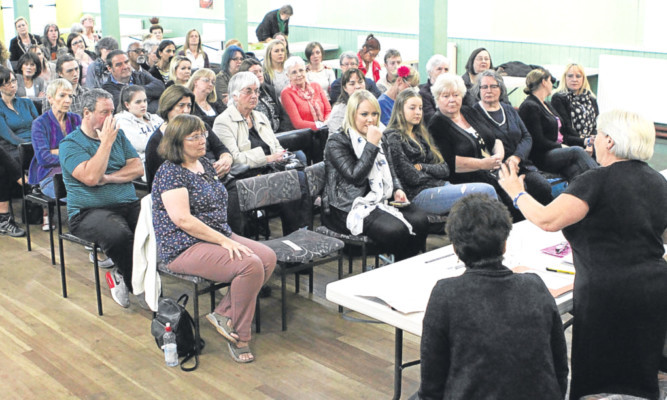
Away from the drama of the big political clashes, hundreds of ordinary Scots are making their voices heard.
A jolly looking lady holds up a handwritten sign to direct people to a Glasgow church hall which looks untouched since the first referendum on Scotland’s constitutional future in 1979.
I am one of four men who have sneaked into St Ninian’s Church Hall run-down save for some excellent sparkly door curtain decorations behind a depiction of Christ for a women’s independence debate.
The atmosphere is friendly but the tenor of the evening is set with the revelation there are 45 Yes voters in a room of 64. Just weeks before polling day, this struck me as bizarre. Are these people looking for confirmation apt for our venue of their own choice or is there just a comfort in being among their own?
It is a situation not uncommon across Scotland in the genuinely uplifting revival of the public meeting we have witnessed over the last year.
As an observer it strikes me these energies would surely better be directed on the doorsteps but I’m given some insight later when one Yesser tells me she’s used the event to “recharge herself” ahead of the last phase of campaigning.
So the three women on the Yes panel are mainly preaching to the converted and former Socialist MSP Carolyn Leckie gets the crowd warmed-up, enthusing about the scores of debates she has taken part in over the last year.
“The biggest party of the last 30 years has been the ‘there’s no point’ party, but this is different. I see disillusionment is being replaced with empowerment.“
It is an astute observation from Leckie who also notes the left-leaning Yes and No panellists mostly agree on the same outcomes on issues such as education or defence, they just differ on the route and how quickly they can get there.
Former Scotland Office minister Ann McKechin says she is “unashamedly” in solidarity with people in poverty in Liverpool as much as Glasgow, a point countered by Leckie who says in the event of a Yes vote Scots will still have solidarity with Liverpudlians, but would have “rejected the state which has failed the people of Liverpool”.
Former Labour MSP Pauline McNeill, aided by her distance from the tribalism of Holyrood, leads the No side’s defence, pointing out that contrary to the way the general debate has gone, the referendum is not about any one party or populist policy.
Responding to a good question about poverty and energy prices, McNeil highlights that nowhere has she seen “an explanation as to how independence would curb the power of the energy companies, so don’t think a Yes vote will automatically see these firms taken to task”.
Despite the partisan questioning, the chairwoman is fair and the quality of exchanges is good.
Labour MSP Patricia Ferguson, with more than a decade’s experience as a health service administrator, and Leckie, as a former midwife, deal with the red hot issue of the NHS without the shrill that has surrounded it in the main campaign.
Leckie and Nationalist MSP Sandra White point to the potentially corrosive knock-on consequences of public spending cuts south of the Border.
Ferguson calmly explains the devolution basics when it comes to the health service, adding that it is an issue that has “depressed, demoralised, frustrated and upset” her.
The Maryhill MSP highlights the SNP’s growing use of private contractors to ease the under-pressure NHS, reflecting on news that day that NHS Greater Glasgow has signed a deal with commercial weight-loss company Weight Watchers to deal with the growing obesity epidemic.
In a moment of rare but welcome candour from a politician, she admits: “I have tried Weight Watchers, more than once, and it didn’t work for me. We are going to have to deal with obesity, it’s a serious problem but I am really not sure going down this private road is the way forward.”
The room is nodding with her for once, though it is unclear if this is about Weight Watchers not working for them or the privatisation.
As has been my experience in so many referendum events away from the usual suspects who bore for Britain/Scotland the best questions or points come from the floor.
One lady stands up to ask: “Why do all the arguments have to be about money?”
Another says: “Why does nobody on the No side talk about what Scotland brings to the union? All we hear is what we get out of it.”
And both sides of the panel are tasked with answering: “What can we hope for in your vision of Scotland’s future?”
At the last gasp we get a direct question from a genuinely undecided voter who agrees with the “social good” goals of independence but wants to know it will be achieved in an increasingly globalised world.
Speaking afterwards, the 33-year-old academic, who asked not to be named, said: “I only asked the question because it seemed so one-sided. I came as I wanted to learn more but away from the theatrics and shouting of the TV debate.”
Is she any further forward?
“Not really,” she replies.
The evening started with 13 undecided voters and ended with nine, all of the movement towards the Yes camp. But is that a good return for taking the three Yes supporters on the panel, plus dozens in the audience, out of the campaign cycle for the evening?
We’ll find out in 11 days’ time.

Enjoy the convenience of having The Sunday Post delivered as a digital ePaper straight to your smartphone, tablet or computer.
Subscribe for only £5.49 a month and enjoy all the benefits of the printed paper as a digital replica.
Subscribe